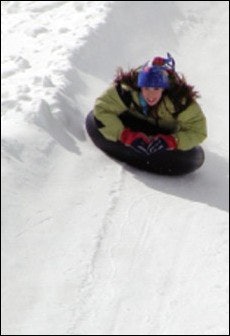A Connecticut court gets specific about what makes a waiver legitimate

Because of the potential risk of injury involved in most athletic, recreational and fitness activities, it is common practice for organizations to require their customers to sign waivers in an attempt to protect the organization from any liability that may result from its negligence.
It is important for organizations to remember, however, that just because someone signs a document claiming to release it from liability, the organization is not necessarily free of all liability if that person is injured. Certainly, a signed waiver won't necessarily prevent an injured party from filing suit.
A recent example is Hyson v. White Water Mountain Resorts of Connecticut Inc. [265 Conn. 636; 829 A.2d 827 (2003)]. On Jan. 30, 1999, Francesca Hyson purchased a ticket to go snowtubing at Powder Ridge, a ski, snowboard and snowtube facility located in Middlefield, Conn., and operated by White Water Mountain Resorts. During her day on the mountain, Hyson claimed that she suffered injuries to her hand and wrist when her inner tube failed to stop at the bottom of the hill and continued over a cliff of snow onto rocky ground. As a result of her injuries, Hyson sued White Water, claiming that her injuries resulted from Powder Ridge's negligence. Specifically, Hyson claimed that the facility's operators were negligent because they:
1. permitted the slope at the bottom of the hill to be excessively slippery;
2. failed to maintain an adequate barrier at the bottom of the hill designed to stop patrons; and
3. failed to post any signs warning patrons of dangerous conditions at the bottom of the hill.
White Water Mountain Resorts denied any negligence or liability involving Hyson's injuries, arguing that all of Hyson's claims were barred because she had signed a "Release from Liability" form. As the form stated:
1. I accept use of a snowtube and accept full responsibility for the care of the snowtube while in my possession.
2. I understand that there are inherent and other risks involved in SNOWTUBING, including the use of lifts and snowtube, and it is a dangerous activity/sport. These risks include, but are not limited to, variations in snow, steepness and terrain, ice and icy conditions, moguls, rocks, trees and other forms of forest growth or debris (above or below the surface), bare spots, lift terminals, cables, utility lines, snowmaking equipment and component parts, and other forms [of] natural or man-made obstacles on and/or off chutes, as well as collisions with equipment, obstacles or other snowtubes. Snow chute conditions vary constantly because of weather changes and snowtubing use. Be aware that snowmaking and snow grooming may be in progress at any time. These are some of the risks of SNOWTUBING. All of the inherent risks of SNOWTUBING present the risk of serious and/or fatal injury.
3. I agree to hold harmless and indemnify Powder Ridge, White Water Mountain Resorts of Connecticut Inc. and/or any employee of the aforementioned for loss or damage, including any loss or injuries that result from damages related to the use of a snowtube or lift.
I, the undersigned, have read and understand the above release of liability.
In addition, White Water argued that even if the court ruled that it was negligent, Hyson had agreed in section three of the release to indemnify it for any loss or injuries related to the use of a snowtube or lift. Therefore, White Water argued that even if it were negligent, Hyson would be financially responsible for any monetary damages.
After reviewing the release, the Superior Court ruled that by signing the release, Hyson expressly released White Water from liability for damages resulting from its negligence. Disappointed with this decision, Hyson appealed to the Connecticut Supreme Court, where she asserted that the release was invalid. In particular, she argued that since the release failed to expressly mention the word "negligence," it should be held void.
In reviewing the language used in the release, the Connecticut Supreme Court first noted that while the release signed by Hyson did not specifically use the word "negligence," it did refer to the "inherent and other risks involved in snowtubing." In addition, the court noted that the release provided a number of examples of the risks involved in snowtubing and stated that "all of the inherent risks of snowtubing present the risk of serious and/or fatal injury." As the court also noted, however, none of the examples used in the release referred to possible negligence by White Water or its employees.
Next, while this was the first time this court had had a chance to rule on this particular issue, it found widespread support both for and against requiring the use of magic words such as "negligence" in releases. For example, in Connecticut's lower courts and some other jurisdictions, the courts have required that any agreement intended to release a party for its own negligence should state so expressly by specifically using the word "negligence." In fact, the Supreme Court noted that several of the Connecticut lower-court cases even involved the defendant in the current case. The other jurisdictions cited by the court that expressly require the use of the word "negligence" include Florida, Maryland, Missouri, New York and Texas. Typical is the language used by the court in Wenzel v. Boyles Galvanizing Co. [920 F.2d 778, 781 (11th Cir. 1991)], which noted that under Florida law, a "clause simply disclaiming liability in general terms is insufficient."
On the other hand, the court noted that not all courts have been so demanding. Some of the jurisdictions cited by the court that do not expressly require the use of the word "negligence" include Colorado and Wyoming. For example, in Heil Valley Ranch Inc. v. Simkin [784 P.2d 781, 785 (Colo. 1989)], the court ruled that the "use of the specific [term] 'negligence' [was] not invariably required."
After reviewing both positions, and acknowledging that the law does not favor contract provisions that relieve a person from his or her own negligence, the Connecticut Supreme Court ruled in favor of Hyson. In reaching this conclusion, the court expressed a preference for the first position and ruled that in order for a party to be released from liability for injuries resulting from its future negligence, it was not unreasonable to require the use of the word "negligence." In looking at the release signed by Hyson, the court found that a person of ordinary intelligence could reasonably believe that, by signing this release, he or she was releasing the defendant only from liability for damages caused by dangers inherent in the activity of snowtubing. By requiring a release to use express language releasing the defendant from liability for its negligence, the court was hoping to prevent individuals from inadvertently relinquishing valuable legal rights.
As for the indemnity statement in section three of the release, the court held that since the release was void, the indemnity statement in which Hyson agreed to indemnify White Water for any loss or damage must also be void.
While the dissent in this case argued that to require exculpatory clauses to specifically contain the word "negligence" would have grievous consequences in the state of Connecticut, especially in the area of recreational activities, the true impact of the decision will probably not be that dramatic. First, requiring recreation facilities to expressly use the word "negligence" should not impose any great burden or cost on the facility operator. While it is true that some facilities may have to rewrite their releases or waivers, the cost and inconvenience of the new documents is much less than a single lawsuit. In addition, by providing Connecticut attorneys with a clear rule as to what is required when drafting new exculpatory agreements, the court will help facility operators stay out of court in the long run.
Second, even though the case was decided by the Connecticut Supreme Court, it has no legal weight outside the state of Connecticut. This is especially true in those jurisdictions where courts have already ruled that for an exculpatory clause to be valid, it need not contain the word "negligence" or any other magic words, as long as the language used is clear and unambiguous.




































